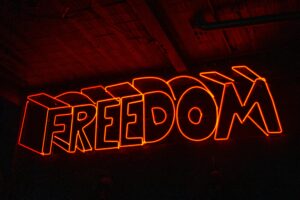Our Freedoms
 Let’s consider the lowly preposition. It’s defined as a word that governs and expresses a relationship between a noun or pronoun and another element in the clause (New Oxford American Dictionary). We learn about them somewhere along the way as part of grammar though I think I began to pay attention to them when trying to learn a second language.
Let’s consider the lowly preposition. It’s defined as a word that governs and expresses a relationship between a noun or pronoun and another element in the clause (New Oxford American Dictionary). We learn about them somewhere along the way as part of grammar though I think I began to pay attention to them when trying to learn a second language.
These little words are important. They help us understand whether to use who or whom for instance. Use whom, the object form, after a preposition like to, for, by, etc. or when to say she and I or her and me. The second comes after a preposition as in “Give it to her and me.”
But that’s not what started me thinking about the importance of these little words. I’m reading one of the library books, I’ve checked out recently. It’s, a cross-over between Black History Month and Women’s History Month, Jenn M. Jackson’s Black Women Taught Us: An Intimate History of Black Feminists. I haven’t finished it because I got sidetracked by Stacy Abrams mystery novel, While Justice Sleeps. When I do finish, I’ll post a Book Note about it on Substack.
But it’s the very first chapter that made me start thinking about prepositions. She explains that she teaches her students the idea that there is being free from and being free to. “Freedom from oppressive structures and from situations that limit our mobility and autonomy…” and freedom to make one’s own decisions. She talks about these ideas in a chapter on Harriot Jacobs, an enslaved woman, who gained her freedom from the demands of her white owner by choosing to hide for years under the ceiling of a cabin on the same plantation. Choosing the restriction was an act of agency and power though it was certainly not without cost.
In thinking about this, I’ve added a third formulation ‘freedom for’, in other words, freedom for what purpose.
I’ve spent much of my life working on university campuses where a fundamental concept is academic freedom. For faculty, it means freedom to teach what they think is important within their field of expertise. It is not freedom to teach any random idea they have. It is freedom from administrative and governmental direction for the research they do and then what they write, publish and teach from that. But what is that freedom for? It’s traditionally been understood that academic freedom leads to the improvement of the world around us, for individuals and communities who benefit from the research and learning. It’s not simply freedom to do anything they want to do and get paid for it, though it is often portrayed that way.
Our Bill of Rights defines a variety of freedoms that we say belong to all of us in the United States, though each of us experiences those freedoms differently depending on our life circumstances. Freedom doesn’t mean we can each do anything we want. When we live in community, our freedom necessarily has constraints. As the saying goes, my freedom to swing my arm ends at your nose. If that wasn’t true, then you don’t have much freedom.
Jackson’s discussion of Harriet Jacobs’ decisions within her limited range of choices started me thinking about the depth and breadth of the concept of freedom and what we choose to do with the freedoms we have. Do we use our freedom of speech to stand up when someone makes a hateful comment about a marginalized, discriminated group or even simply about a colleague or member of our acquaintance? Do we exercise our right to protest against injustice. Do we understand that freedom of religion means all religions, not merely our own? Do we understand what we as a society stand to lose when freedom of the press is constrained by politics or money? Do we realize what we lose when academic freedom is attacked? Do we understand what all these freedoms are ultimately for?
Something to think about – what do freedom to and freedom from mean to you and what are those freedoms for?
Take care,
Gage
